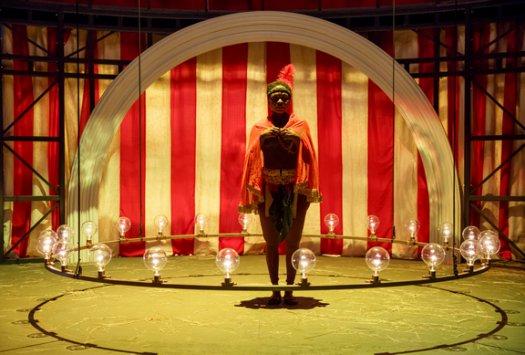Venus
The author does not fundamentally trust the strength of her powerful central figure, taking a circuitous route to tell an important story.

Zainab Jah in a scene from Suzan-Lori Parks’ “Venus” (Photo credit: Joan Marcus)
[avatar user=”Joel Benjamin” size=”96″ align=”left” ] Joel Benjamin, Critic[/avatar]The problem at the heart of Venus is that its author Suzan-Lori Parks does not, fundamentally, trust the strength of her central figure, Miss Saartje Baartman (aka the Venus Hottentot). In her bizarrely overwritten play, the inherent emotional power of this figure goes missing, as if Parks is purposely avoiding an Elephant Man redux by showing off every theatrical gimmick in her playwrighting arsenal.
In Bernard Pomerance’s The Elephant Man, the main character is the deformed John Merrick. Despite a bit of theatrical stylization, Merrick’s story is told in a fairly straightforward manner, a method Ms. Parks assiduously avoids in Venus. We feel for Merrick. Ms. Parks seems more concerned with the political and social parallels between the early 19th century England and our society. Her over-the-top stylistic distortions prevent our getting close to and feeling for this poor creature.
Ms. Baartman, a real-life, historical character, was also considered “deformed” by the early 19th century European audiences that found her exotically large-sized buttocks an object of amusement and prurient interest. Instead of delving into Venus’ psychology and the racial attitudes of the times—sadly still an important issue—Parks diffuses the potential power of this story by mounting a giddy carnival sideshow, full of exaggeratedy cartoonish characters, costumed and bewigged with cartoonish “subtlety” by, respectively, Emilio Sosa and J. Jared Janas. (To be fair, these design choices have to be partially the responsibility of this production’s director, Lear deBessonet.) She further bogs down the plot with with a ridiculous visit to Restoration comedy in a series of play-within-a-play scenes that mocks Venus’ painful story.
Her choice of a sideshow milieu is, perhaps, apt, since that is how Venus was displayed after being brought from Africa to England under fraudulent circumstances by The Man (John Ellison Conlee) and The Man’s Brother (Randy Danson). This is an England that was both disgusted and titillated by her unique form.

John Ellison Conlee and Zainab Jah in a scene from Suzan-Lori Parks’ “Venus” (Photo credit: Joan Marcus)
A character called The Negro Resurrectionist (a stalwart, charismatic Kevin Mambo) plays a one man Greek chorus, wandering through the action, leading the audience through the complications of the plot while also commenting on Venus’ many tribulations, including an affair with the Baron Docteur (also Conlee, who somehow makes these two despicable characters three-dimensional human beings).
The second act leads off with scenes of this extended tryst between the Docteur and Venus which turns the play into a nighttime soap with its overheated “Love me! Hold me! Marry me!” dialogue. We lose sight of the mistreatment of a woman who died before the age of thirty, gawked at, sexually used and then tossed away by a hypocritical society that more than superficially resembles ours with its sexual and racial politics. Ms. Parks turns her into a spurned lover instead, diminishing her in the process.
This is, indeed, a luxuriously appointed production with its period costumes and its large, flexible semi-circular set that transforms from an African dock to the sideshow to the Docteur’s bedroom. Matt Sanders does a masterful job with his scenery helped enormously by the lighting of Justin Townsend, the sound design and clever music by Brandon Walcott. (Ms. Parks wrote music and lyrics for the original songs.)
Ms. Parks chooses to have her black characters speak in a patois to contrast them with the European characters (many played by actors of color who appeared to be thoroughly enjoying the satirical edge of the dialogue, something Ms. Parks does extremely well).

The Cast of Suzan-Lori Parks’ “Venus” (Photo credit: Joan Marcus)
Lear deBessonet, the director, does what she can to bring to life Ms. Parks’ unwieldy vision, but the flamboyance of this production and its unwieldy structure overwhelm her efforts. There’s a lot there to savor but most of the superficial decoration helps only to avoid what should have been a moving portrait of a victim of her time.
The adept cast is led by Zainab Jah in the title role. In the one detail in which Parks’ play matches The Elephant Man, Ms. Jah, a shapely, lovely actress, transforms herself into Venus right in front of the audience, painfully pulling on a padded costume that leaves nothing to the imagination. Ms. Jah’s Venus is a strong figure who rolls with the punches but is no match for the hypocrisy of the powers that be. She is a strong enough actor to keep her head above the fray.
I very much admired and was deeply affected by Parks’ Father Comes Home from the Wars and The Death of the Last Black Man in the Whole Entire World whose fanciful stylizations enhanced and were essential to the unraveling of their plots, unlike Venus in which Parks works too hard with little more than superficial results to meld the drama with the history lesson.
Although Venus takes a little-known incident and attempts to turn it into a weighty treatise, Suzan-Lori Parks’ extraordinary talents for once failed her.
Venus (through June 4, 2017)
Signature Theatre
The Pershing Square Signature Center, 480 West 42nd Street, in Manhattan
For tickets, call 212-244-7529 or visit http://www.signaturetheatre.org
Running time: two hours and 15 minutes including one intermission






Leave a comment